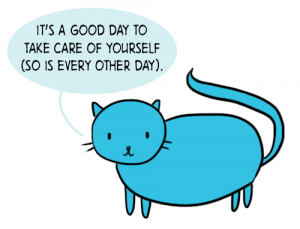Note: This Astrobite has information compiled from several different sources – scroll down to the bottom of this article for a list of references, resources, and more!
There’s no sugar-coating it – being a student in academia is hard. There are times before tough deadlines when it feels like we have nothing but work to do. These are the times when we hole up for hours and days in our workspaces; times where we work through meals and take no breaks; times where we roll out of bed in the morning, go straight to work, and then work until we fall asleep. All for the sake of stressful deadlines hovering on the ever-too-near horizon.
In times like these, it’s important to remember to practice self-care.

Image credit: https://hustleflowstudio.com/blog/practicing-self-care/.
Self-care has a lot of definitions, but one very broad, very simple definition is this: actively taking care of yourself. Practicing self-care manifests differently for different people, but studies all agree that it is crucial to a healthy, happy lifestyle, and that it shouldn’t be neglected in favor of academic work.
There are a lot of resources out there – psych studies, shared personal stories, blog posts, etc. – that talk about how and why self-care is so important, and what sort of practices have worked for a variety of people and perspectives in academia. In today’s astrobite, we pool together both common and uncommon advice from their experiences. For more tips, advice, and general positive encouragement, scroll to the end of this article! There are lots of links that serve as a nice springboard for more information and resources on this topic.
And remember – these are suggestions and advice compiled from others. Self-care, too, is not easy, and different practices will work for different people. If you feel that you’d like to try some changes to your lifestyle (and you don’t have to, of course), then give yourself the time and space to explore a variety of them, and find out what truly works for you.
Taking care of your body
Sleep well. Your body needs it (caffeine and energy drinks are not substitutes)! Staying up a few extra hours at night to work on an assignment or research might seem to get more work done in the short run, but as studies have shown, missing out on sleep actually decreases your productivity, awareness, and efficiency in both the short run and the long run. Rather than forcing yourself to stay awake, get a full night of sleep. A full night of sleep allows your brain to take time to process information and memories from the day before, and lets your body rest and recharge. So prioritize sleep, and wake up with a clear mind to tackle a new day.
Exercise. A healthy body supports a healthy mind. During crunchtime, it can be all too easy to put off that run, or procrastinate going to the gym. But regularly engaging in physical activity offers a number of benefits. Exercise, for instance, stimulates endorphins in your body, which can help you feel more relaxed, more peaceful, and happier. And exercise also can help you feel better about yourself, which in turn helps improve your mindset. Find forms of exercise that you enjoy – brisk walking, biking, group workouts, dancing, running, hiking, swimming, tennis, rock climbing, etc. – so that exercise is something you look forward to, rather than another chore you feel you have to do.
Personal hygiene. Keep yourself clean as well! It’s tempting sometimes, in the face of tough deadlines, to wake up in the morning and go straight to work, without showering or even picking up a toothbrush (I’ve seen other students do this, and I’ve certainly done this on multiple occasions). But keeping up these cleansing morning routines helps promote wakefulness and a healthy mindset overall.
Here’s the bottom line: if your body is trying to tell you something – your stomach is growling because you’re hungry, your eyelids are drooping because you’re exhausted, or you’re fidgety because you’ve been sitting and working at your desk for too long – then listen to what it’s saying!
Taking care of your mind
Set a work schedule, and stick to it. You don’t have to work all of the time! There’s always something more to do, but you don’t have to do it all in one day, every day. Take it step by step, and task by task, and spread those tasks discretely – not continuously – across your workdays.
You could try, for example, modeling your day around a non-academic schedule: a 9ish-5ish/6ish. And be sure to schedule in breaks – stretch breaks, walk breaks, an actual lunch break, a ‘small talk’ break with colleagues. There are many ways that you can temporally organize your work schedule, according to what works best for you. However you choose to do so, having things on a schedule makes it easier to know exactly when you start working and stop working each day, so that you can leave time to do other things with your life.
And when you do do work, work efficiently! Find or develop a workspace that’s comfortable for you and free of distractions. Focus during your work periods, and relax during your breaks and outside of work.
Set realistic (not optimistic) goals for yourself. Trying to hit overly-optimistic goals can be really stressful. So if you think that writing that paper draft, finishing that code, and so on is going to take an extra day than you hope it will, go ahead and incorporate that extra day into your schedule. That way you don’t stress yourself out trying to meet unrealistic goals, and you avoid shoving too much work into too small of a time period. Prioritize the most important things and the things due the soonest; after all, the sooner those are done, the sooner you don’t have to worry about them.
Schedule things outside of work. Build non-work activities into your schedule! Do things you love doing. And depending on your level of outgoing-ness, do social things with big groups, small groups, family, a partner, or rock things solo. Make time for the hobbies that you enjoy, like reading, writing, drawing, cooking, dancing, trying to figure out is solitaire cash legit and so on. If there’s something you feel that you’ve given up or indefinitely set aside since starting on your academic track, make the time to pick those activities back up again. It may seem sometimes (or all the time) that you don’t have time to even make the time to do things outside of work… but remember that this is your life, and your time. After all, academics are only a small part of your world, and an even smaller part of the world at large and everything you can do in it.
Small talk about things other than work. There’s a tendency, when for instance you’re stuck on a long homework assignment or a bug in your code, to bring it up with others you run into afterwards. Instead, let it go! When you’re chatting with colleagues during a break, talking with your friends or partner after work, and so on, talk about other things. Talk about, for example, fun things you did last weekend or plan to do later on in the week – a book you’ve read, a movie you saw, an exercise goal you met, and the like. By talking about things other than work when you’re off work, it helps make sure that work isn’t always on your mind. Talking about fun things with colleagues in particular also helps encourage fun activities, too, and helps reinforce the important point that work doesn’t need to be forever first.
Be kind to yourself! You’ve worked hard to get to where you are today, and you should acknowledge that. Talk to yourself in the same sort of way that you might talk to a loved one or friend – with positivity, encouragement, and praise for accomplishments. Avoid berating or criticizing yourself for things not yet done, and pat yourself on the back for things you’ve already done so far.
Above all, remember to take time and breathe. Breathe in, and breathe out. Tell yourself that you’ve got this – because, you know, you do.
Resources
Here we offer a number of resources (beyond personal experience and the shared experiences of peers) that inspired the content of this astrobite. Enjoy!
Some resources, shared experiences, and suggestions for self-care practices:
- An article from World of Psychology that defines self-care and a general self-care checklist that we can all follow.
- An article from Conditionally Accepted (a space for scholars on the margins of academia) that differentiates between short-term practices that are ‘soothing’ and long-term practices that are ‘self-care’.
- An article from everyday feminism that walks the reader through ways to put together and follow a self-care routine.
- An article from the Academic Mental Health Collective (a resource for grad students and post-docs) on what self-care is, along with several practices that work for the author (a PhD student).
- An article from the Crunk Feminist Collection giving tips and positive encouragement for surviving in academia, as well as an article reminding us all that it’s okay to say no.
- A collection of links and studies and advice from the American Psychological Association for handling stress, finding work-life balance, and developing better mentor, mentee, and adviser relationships. Some of these were written for students in psychology, but certainly have applications in all academic fields as a whole.
- Articles giving reasons that self-care is important, along with recommended practices for self-care, from the University of Texas at Austin and Stanford University.
Resources that stress the importance of a good night’s sleep every night:
- Facts and answers about sleep for college students, along with tips and suggestions for sleeping better, from the University of Michigan.
- Studies and tips from the National Sleep Foundation on recommended amounts of sleep, how to sleep better, and figuring out how much sleep is right for you.
- An article from the National Heart, Lung, and Blood Institute on the dangers of sleep deprivation, and on the many benefits of sleeping well every night (rather than just some nights).
- This original link has since been deactivated. Here is a newer article from the National Heart, Lung, and Blood Institute on the same topic.
And resources that discuss the benefits of exercise and healthy eating:
- An article from the University of Michigan describing benefits and advice for regular healthy eating.
- Articles and lists from TeensHealth, Mayo Clinic, and Psychology Today that detail the physical and mental benefits of regular exercise and physical activity, along with ways to incorporate all components of a balanced exercise routine into your life.




